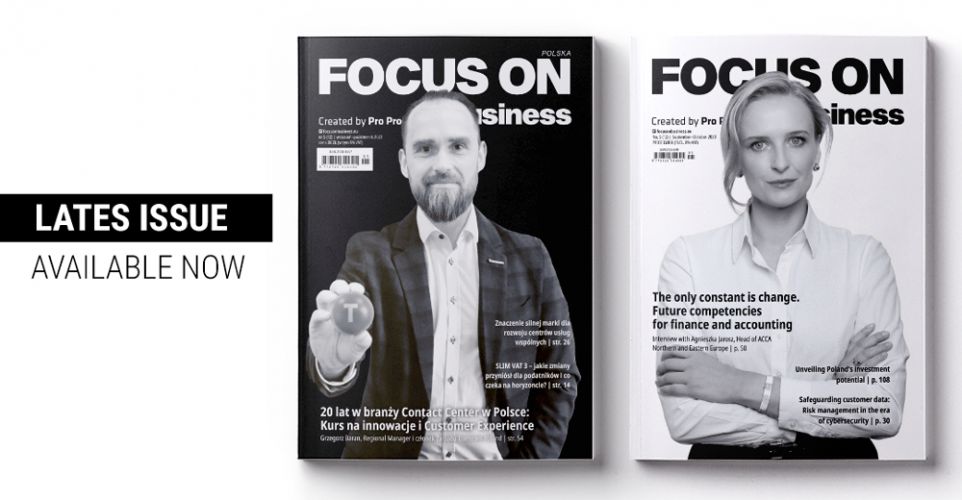Last call to overcome international barriers

As demographic shifts and labor shortages persist, the need for regulatory enhancements becomes evident. Magda Dąbrowska and Paweł Dąbrowski from the Grupa Progres shed light on the pressing issues influencing the Polish labor market. In the interview, they explore both the challenges faced and the potential opportunities that arise, particularly in the realm of hiring foreign workers.
FOCUS ON Business: What is the current situation on the Polish labour market?
Paweł Dąbrowski, Grupa Progres: Considering all the factors and challenges posed by the war in Ukraine, as well as by inflation and by the general economic situation, I have to admit that the labour market is currently doing quite well. Although entrepreneurs are not yet filled with much optimism, I have the impression that many of them have become accustomed to the difficult conditions in which they have to operate – they are still trying to run and even develop their businesses. Staffing needs are therefore very high, and in almost every industry, demand for workers exceeds supply. To many, it may seem that after all, the topic of staff shortages comes back like a boomerang, and yet companies always somehow manage. And, of course, we have been saying for many years that the growth of Polish companies does not follow the growing number of applicants for full-time positions. However, we have already reached a wall, and if we don't tear it down, soon enough it will actually turn out that companies in Poland are standing still only because there is no one to work in them.

Magda Dąbrowska, Grupa Progres: The situation is not made any easier by the fact that for more than 3 years Polish employers have been driving on a road full of sharp turns, before which there are no warning signs. Currently, the labour market lacks many of the necessary regulations that allow companies to hire candidates from distant locations without problems. There have been quite a few changes, but they don't fully meet the expectations of employers. Moreover, the recently much-discussed topic of the referendum stirs emotions among many Poles. I have the impression that – amidst all this – we are losing the full picture of the situation. And the picture is that our country has a lot of catching up to do when it comes to migration policy.
Changes are necessary, because without appropriate legislation to speed up and simplify procedures for hiring foreigners, the labour market will not grow. We are already affected by this, and if you ask what the labour market situation is at the moment, we are not in the best shape from the point of view of the regulations governing its functioning.
Does this mean that one of the biggest challenges is precisely the insufficient number of people willing to work?
MD: Exactly, and it's no longer just about Poles, because – as we know – in the case of our country's population, demographic statistics leave no doubt. For many years we have been facing negative birth rates, as well as an ageing population, resulting in a large shortage of working-age citizens – by 2035 this group will be reduced by 2 million people. Moreover, according to forecasts, by 2050 there will be nearly 5 million fewer people – about 12 percent of the population, one-third of the total number of citizens will be 65+, and only one in five of our country's residents will be under the age of 24. This means that – given the staffing needs – it is still not enough foreigners working in Poland.
Unfortunately, at the moment, no changes in the regulations to facilitate their employment are yet certain, but without their implementation, i.e. a well-thought-out program for speeding up procedures, domestic employers will not have anyone to delegate work to in a matter of time. Half of them are already complaining about the lack of willing applicants. At this point, the scale of the problem is not yet critical, because even despite the long official process, there is no shortage of those willing to take up a full-time position in Poland, but this is really the last call for change. It was accelerated by the war in Ukraine, which showed how our eastern neighbours are an essential participant in the domestic labour market, and what will happen when their presence in Poland becomes uncertain, and we will have no one to replace them.
Even if changes in procedures occur, will foreigners be willing to come to Poland, and when they do, will they feel comfortable in our country?
PD: In my opinion, yes, and our research proves it. They show that foreigners, who have decided to take a full-time job in Poland, rate it as a safe destination for labour migration – this is the opinion of 89 percent of those surveyed. Only 10–11 percent – has doubts in this area or immediately admits that it is not a safe country to live in. However, as I said, most feel comfortable in Poland, and the opinion of our country spreads around the world and attracts more newcomers, including those from distant lands.
According to our data, more than 50 nationalities are constantly active in the domestic labour market. This is also confirmed by statistics from the Ministry of Family and Social Policy, which show that the number of notifications of foreigners taking up employment – registered in 2022 – included 55 nationalities. The Social Security Office's statistics also show that there is no shortage of applicants for full-time jobs. The Office reports that the number of insured foreigners reached 1 million in December 2022. 1 million 63 thousand 300 people. This means that it increased by 191,700 people compared to January 2022.
What about employers’ perspective? Do they want to hire foreigners, including those from distant locations?
PD: I think the people are very tolerant towards foreigners. Statistically, as many as 56 percent of employers are willing to hire foreigners, and nearly 60 percent of professionally active Poles believe that their companies should be more diverse and open to diversity including also the ethnic one. It sounds interesting, but it is a huge challenge for any organization, because diversity still goes hand in hand with stereotypical thinking, at least at the beginning of cooperation.
Poles also often fall into this type of traps and schemes where everything is put under one denominator. They have plenty of beliefs that the French are lazy, the Germans have no sense of humour, the Italians are unorganized or the Chinese are not accepting of other cultures, and these are just a few of the many myths repeated about the people of a given country. They often go hand in hand with opinions that foreigners living in Poland do not respect local norms and values. This is a false belief, as most of them respect the culture and customs of the country they are in. A lack of knowledge of the language and of local traditions or rules of behaviour can, of course, lead to misunderstandings, but this does not mean that visitors are irresponsible or rude.
So is stereotyping a major challenge in internationalizing the labour market?
MD: Definitely yes, and unfortunately stereotypes, which are common in Poland and other countries, are very harmful and can lead to discrimination and inequality in the workplace. Many domestic companies are trying to counter them – 54 percent have recently introduced or modified codes of ethics and programs dedicated to particular groups of employees – including foreigners – who expect their rights to be respected.
Despite supervisors' growing awareness, many still have a lot of lessons to catch up on. As the Grupa Progres' survey showed, as many as 46 percent of companies still do not have a code of ethics, i.e. a document that defines a set of standards for ethical and honest behaviour and conduct of employees. And the lack of it is a straight path to a lot of abuse, which can be already seen. According to the “Occupational Safety in Poland” report, 29 percent of respondents have experienced discrimination – including 10 percent who have experienced it multiple times, and 46 percent have witnessed discriminatory behaviour (13 percent have seen it multiple times).
A survey commissioned by the Ombudsman shows that Poles consider ethnic or national origin, among other reasons, to be the most common reason for discrimination. In the U.S., as many as 61 percent of workers have experienced discrimination based on age, gender, sexual orientation and precisely on nationality or race, while in the UK it was 36 percent of professionally active workers.
What should be done to overcome these stereotypes?
MD: Campaigns that dispel stereotypical thinking about foreigners and Poland's migration policy, which is adapted to the changes taking place, will certainly encourage more employers to hire foreigners and, in turn, encourage them to take jobs in Poland. Some will stay with us for a longer period of time, but most declare that they want to work in Poland and will return home when they have saved enough money.
Regardless of the visitors' plans, it is necessary to take care of all aspects that are crucial to ensure that their stay in Poland brings only positive impact to everyone, for example, in terms of safety. Fortunately, its level has not deteriorated so far, despite the significant increase in the number of foreigners in our country.
Thank you for the interview.
This article comes from magazine:
FOCUS ON Business #12 September-October (5/2023)
 Check the issue
Check the issue








